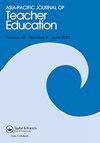Teacher professional learning and development: linear discourses and complexities of teacher learning
IF 1.6
3区 教育学
Q2 EDUCATION & EDUCATIONAL RESEARCH
引用次数: 2
Abstract
ABSTRACT Understanding teacher learning, and relations between that learning and practice, has become a research priority in the quest for quality. Managerial policy discourses that commodify teachers as academic capital encourage institutions to adopt linear models of professional learning and development (PLD) as auditable value-adding, yet this perspective is at odds with conceptualisations of teacher learning as complex, unpredictable, and individually unique. Whilst teacher PLD defies reductionist theorisations guiding its provision and evaluation, government and institutional policies continue to be dominated by rather simplistic linear and outcomes-focussed conceptualisations. Drawing on interview data, this paper explores practitioners’ own understandings of lived experiences of learning through formal PLD in settings seemingly dominated by linear discourses of relations between learning and practice. We discuss how teachers understand and (re)negotiate their formal PLD experiences in and through practice amidst relational complexities to offer suggestions for rethinking how teachers and institutions approach, participate in, and learn from formal teacher PLD experiences, and for disrupting the linear discourses that dominate and complicate the complexity and nature of teacher learning and practice.教师专业学习与发展:线性话语与教师学习的复杂性
了解教师学习,以及学习与实践之间的关系,已成为追求质量的研究重点。将教师商品化作为学术资本的管理政策话语鼓励机构采用专业学习和发展(PLD)的线性模型作为可审计的增值,然而这种观点与教师学习复杂、不可预测和个体独特的概念不一致。虽然教师PLD无视简化理论指导其提供和评估,但政府和机构政策继续被相当简单的线性和以结果为中心的概念所主导。根据访谈数据,本文探讨了从业者对在看似由学习与实践关系的线性话语主导的环境中通过正式PLD学习的生活经验的理解。我们讨论了教师如何在关系复杂的实践中理解和(重新)协商他们的正式PLD经验,并通过实践提供建议,以重新思考教师和机构如何接近、参与和学习正式的教师PLD经验,并打破主导和复杂化教师学习和实践的复杂性和本质的线性话语。
本文章由计算机程序翻译,如有差异,请以英文原文为准。
求助全文
约1分钟内获得全文
求助全文
来源期刊

Asia-Pacific Journal of Teacher Education
EDUCATION & EDUCATIONAL RESEARCH-
CiteScore
4.40
自引率
7.70%
发文量
29
期刊介绍:
This journal promotes rigorous research that makes a significant contribution to advancing knowledge in teacher education across early childhood, primary, secondary, vocational education and training, and higher education. The journal editors invite for peer review theoretically informed papers - including, but not limited to, empirically grounded research - which focus on significant issues relevant to an international audience in regards to: Teacher education (including initial teacher education and ongoing professional education) of teachers internationally; The cultural, economic, political, social and/or technological dimensions and contexts of teacher education; Change, stability, reform and resistance in (and relating to) teacher education; Improving the quality and impact of research in teacher education.
 求助内容:
求助内容: 应助结果提醒方式:
应助结果提醒方式:


